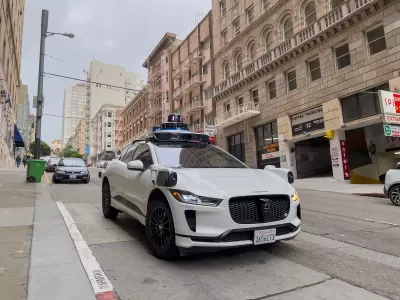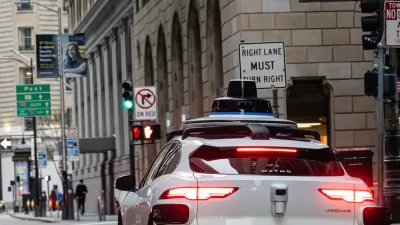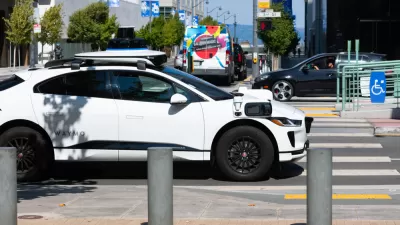Local officials want more control over how and where autonomous cars are deployed.

A series of proposed laws in California could clarify how commercial autonomous vehicles (or robotaxis) are regulated and give local governments more control over their deployment, reports Rebecca Bellan in Tech Crunch. “One bill, SB 915, stands out because it could give cities more power to set their own rules around robotaxis — things like hours of operation and appropriate pickup and drop-off locations.”
Self-driving cars became a major issue in California last year, when a state commission approved their deployment on city streets despite vocal opposition from local leaders.
Bellan outlines the proposed bills that will be considered in this legislative session, describing how each would impact AV deployment and regulation. Other bills require human operators in autonomous heavy-duty vehicles, call for geofencing protocols and more robust reporting, and open the door to fining car manufacturers for infractions committed by autonomous cars. None of the bills would allow cities to ban AVs outright, but industry leaders say the patchwork of regulations that will likely result from local control could slow the industry’s growth.
FULL STORY: A wrestling match over who should control robotaxis is playing out in California

Planetizen Federal Action Tracker
A weekly monitor of how Trump’s orders and actions are impacting planners and planning in America.

Maui's Vacation Rental Debate Turns Ugly
Verbal attacks, misinformation campaigns and fistfights plague a high-stakes debate to convert thousands of vacation rentals into long-term housing.

San Francisco Suspends Traffic Calming Amidst Record Deaths
Citing “a challenging fiscal landscape,” the city will cease the program on the heels of 42 traffic deaths, including 24 pedestrians.

Defunct Pittsburgh Power Plant to Become Residential Tower
A decommissioned steam heat plant will be redeveloped into almost 100 affordable housing units.

Trump Prompts Restructuring of Transportation Research Board in “Unprecedented Overreach”
The TRB has eliminated more than half of its committees including those focused on climate, equity, and cities.

Amtrak Rolls Out New Orleans to Alabama “Mardi Gras” Train
The new service will operate morning and evening departures between Mobile and New Orleans.
Urban Design for Planners 1: Software Tools
This six-course series explores essential urban design concepts using open source software and equips planners with the tools they need to participate fully in the urban design process.
Planning for Universal Design
Learn the tools for implementing Universal Design in planning regulations.
Heyer Gruel & Associates PA
JM Goldson LLC
Custer County Colorado
City of Camden Redevelopment Agency
City of Astoria
Transportation Research & Education Center (TREC) at Portland State University
Jefferson Parish Government
Camden Redevelopment Agency
City of Claremont





























